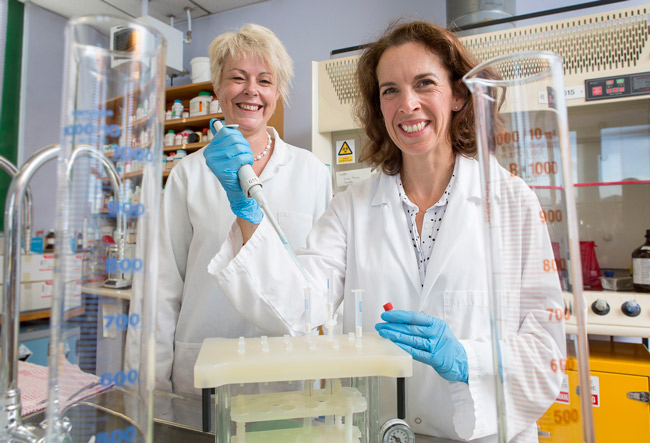
A team effort ... Associate Professor Natalie Medlicott (left) and Dr Ailsa McGregor (right) will work with Professor Paul Glue (absent) to develop a new medication for severe pain, after winning the University's 2017 Translational Research Grant competition. Photo: Sharron Bennett.
An idea that could revolutionise the management of severe pain has won the University's 2017 Translational Research Grant.
Dr Ailsa McGregor (of Pharmacy) will work with Associate Professor Natalie Medlicott (also of Pharmacy) and Professor Paul Glue (of Psychological Medicine), to develop a novel medication for severe pain that will increase pain control, prevent tolerance and reduce side effects.
She says the team was really excited to win the competition, which is now in its fifth year.
"Winning this competition will allow us to develop a new treatment and test its effectiveness in human patients."
“I know the competition was tough and we are so happy to win. We are really looking forward to getting the project moving.”
Health Sciences' Associate Dean, Research Commercialisation, Professor Ian Tucker says the Translational Research Grant is an initiative to assist researchers in the pursuit of research which translates into societal benefits.
About one in six New Zealanders lives with severe pain, and conditions that produce severe pain have a significant impact on patients' quality of life and are a challenge to treat.
“The mechanisms underlying these pain conditions are complex and resistant to treatment with conventional pain relieving agents like paracetamol and non-steroidal anti-inflammatories,” Dr McGregor says. “Treatment for severe post-operative pain and pain associated with arthritis, nerve injury and cancer is typically with opioid drugs. While effective, opioids are associated with significant dose limiting side effects including constipation, nausea and sedation and the development of tolerance and dependence.”
Their winning idea may change all of this.
“We've had a real focus in the lab for the past few years to make a conscious effort to translate our research into products or services that deliver benefit to patients,” Dr McGregor says.
“Winning this competition will allow us to develop a new treatment and test its effectiveness in human patients. If we show benefit in our preliminary human studies, we will look to carry out a larger scale clinical trial in patients with severe pain related to a number of different conditions.”
"Now we need to take that knowledge from the lab and apply it to health problems to generate real life solutions with tangible benefits."
She says it was important for her team to take their science and make an impact.
“In the past we did lab-based research to understand how things work. Now we need to take that knowledge from the lab and apply it to health problems to generate real life solutions with tangible benefits.”
She says this project needs a multidisciplinary team.
“I have expertise in preclinical models, Associate Professor Medlicott has expertise in formulations and pharmacokinetics, Professor Glue has extensive experience with clinical studies and our commercialisation manager is Alex Tickle.”
Professor Tucker says the selection panel for the 2017 contest – which included two external innovation experts as well as staff from both the University and Otago Innovation (OIL) – was very impressed by the quality of the applications.
The 2017 contest saw OIL offer coaching on how to 'pitch' a presentation of this type – and most applicants took advantage of this learning opportunity.
Professor Tucker says that as well as working with Dr McGregor and her collaborators, OIL staff will also engage with and encourage the other applicants in their translational research efforts.
